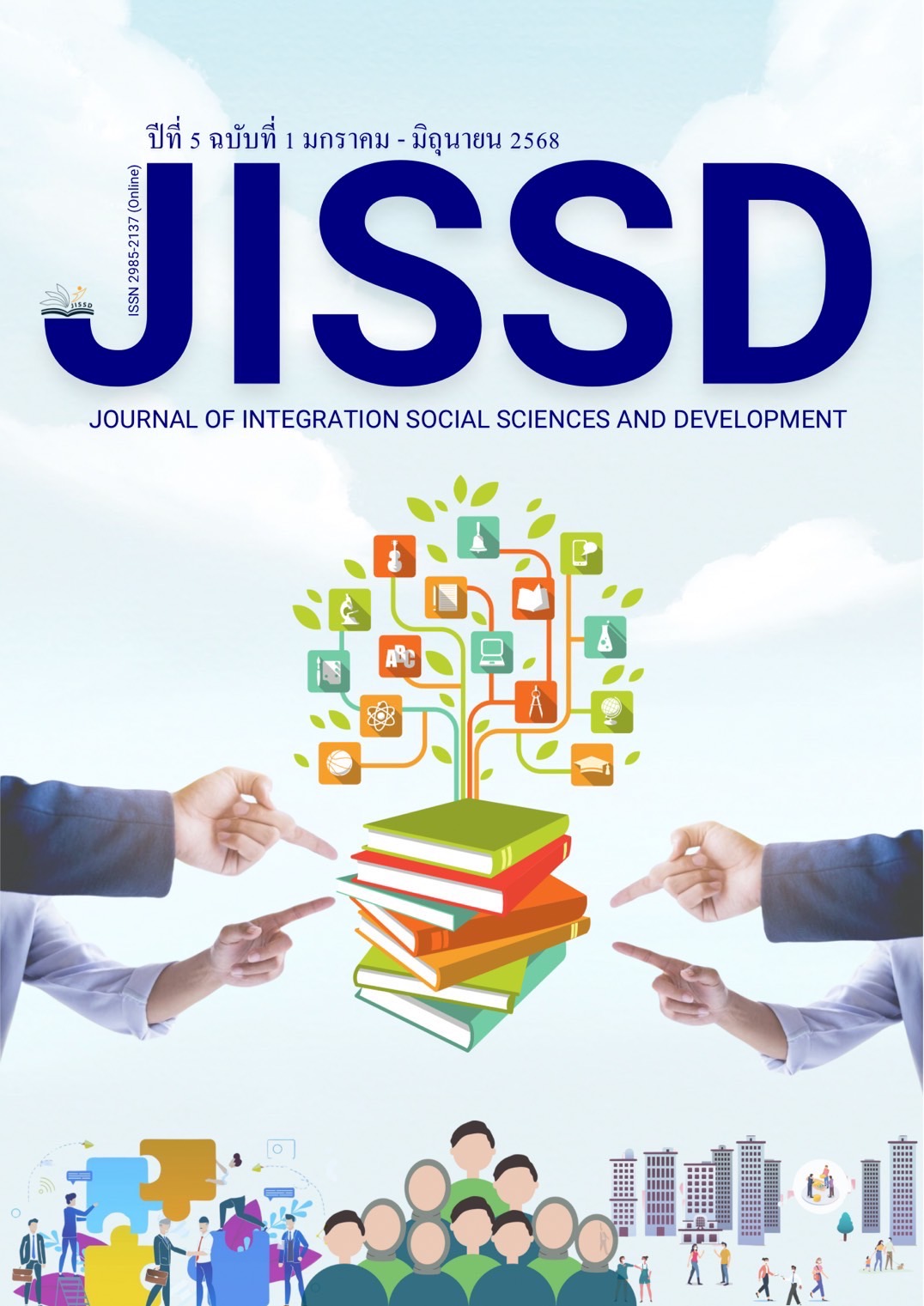Project-based learning experience management for developing executive function (ef) skills in early childhood independent study
Main Article Content
Abstract
The objectives of this research were: 1) To study the development of executive function (EF) skills in first-year preschool children through project-based learning experiences, and 2) Compare the EF skills of preschool children before and after participating in project-based learning. The sample group consisted of 30 first-year preschool children enrolled in the 2024 academic year at a school located in Don Mueang District under the Bangkok Metropolitan Administration. The research employed a one-group pretest-posttest experimental design. The research instruments were divided into two types: 1) The implementation tools included 15 project-based learning plans aimed at developing EF skills in preschool children, and 2) The data collection tool was a 15-item EF skill assessment form based on the KU-THEF framework developed by the Thai Health Promotion Foundation. The assessment used a 3-point rating scale or qualitative evaluation based on observed behaviors, in accordance with the EF assessment tool for preschool children (Mahidol University, Faculty of Medical Sciences, 2019). Data were analyzed using basic statistics and the dependent t-test.
The results showed that: 1) The EF skills of the preschool children improved in all three areas after participating in project-based learning experiences; 2) The comparison between pretest and posttest EF skills revealed a statistically significant improvement, with a pretest mean of 6.17 and a posttest mean of 12.27, a difference of 6.05 points. The t-value was 31.276, indicating that the EF skills of the preschool children after the intervention were significantly higher than before, at the .05 level of significance.
Article Details
References
กระทรวงศึกษาธิการ. (2560). หลักสูตรการศึกษาปฐมวัย พุทธศักราช 2560. สำนักงานคณะกรรมการการศึกษาขั้นพื้นฐาน.
คันธรส ภาผล. (2563). ผลการจัดกิจกรรมนิทานหุ่นเงาที่ส่งผลต่อส่งเสริมการคิดเชิงบริหารสมอง สำหรับเด็กปฐมวัย. วารสาร ครุศาสตร์สารมหาวิทยาลัยราชภัฏบ้านสมเด็จเจ้าพระยา, 14(1), 100-113.
จิระพร ชะโน. (2562). การคิดเชิงบริหารกับการพัฒนาเด็กปฐมวัย. วารสารศึกษาศาสตร์ มหาวิทยาลัยมหาสารคาม, 13(1), 7- 17.
ประเสริฐ ผลิตผลการพิมพ์. (2561). เลี้ยงลูกอย่างไรให้ได้ EF. กรุงเทพมหานคร: สำนักพิมพ์ แพรง เพื่อนเด็ก.
พระราชบัญญัติการพัฒนาเด็กปฐมวัย. (2562). การพัฒนาเด็กปฐมวัย. ราชกิจจานุเบกษา ตอนที่ 56 ก. 136: 5-16; 30 เมษายน 2562.
นวลจันทร์ จุฑาภักดีกุล และคณะ. (2560). โครงการวิจัยพัฒนาแบบประเมินพัฒนาการด้าน EF ของเด็กปฐมวัยในประเทศไทย. สถาบันวิจัยระบบสาธารณสุข (สวรส.).
นวลจันทร์ จุฑาภัคดีกุล. (2559). การพัฒนาทักษะสมอง EF สำหรับการเรียนรู้ ในศตวรรษที่ 21. การประชุมทางวิชาการของคุรุ สภา ประจำปี 2559 “การวิจัยนวัตกรรมการเรียนรู้และการจัดการศึกษาเพื่อการพัฒนาที่ยั่งยืน”. สำนักงานเลขาธิการคุรุสภา.
สินีนาฎ แสงแพง และปัทมาวดี เล่ห์มงคล. (2563). ผลของการจัดกิจกรรมการเล่านิทานประกอบบทบาทสมมติเพื่อส่งเสริม ความเป็นพลเมืองในเด็กปฐมวัย. วารสารจันทรเกษมสาร, 26(1), 117-130.
สุภาวดี หาญเมธี. (2559). พัฒนาทักษะสมอง EF ด้านการอ่าน. กรุงเทพฯ : บริษัท ไอดีออล ดิจิตอลพริ้นท์จำกัด.
Greenberg, M. T. (2006). Promoting resilience in children and youth: Preventive interventions and their interface with neuroscience. Annals of the New York Academy of Sciences, 1094(1), 139-150.
Helen, L., St. Clair-Thompson and Susan E. Gathercole. (2006). Executive Functions and Achievements on National Curriculum Tests: Shifting, Updating, Inhibition, and Working Memory. Retrieved March 9, 2025, from http://www.cogmed.com/executive-functions-achievements-national- curriculum-tests- shifting-updating-inhibition-working-memory.
Katz & Chard, 2000; Helm & Katz, 2011). Young Investigators: The Project Approach in the Early Years. Early childhood education series.
McClelland, M. M., Acock, A. C., and Morrison, F. J. (2006). The impact of kindergartenlearning-related skills on academic trajectories at the end of elementary school. Early Childhood Research Quarterly, 21, 471–490.
Idstein, Ph.D. and Nora D. Volkow, M.D. (2002). Drug Addiction and I Neurobiological Basis: Neuroimaging Evidence for the Involvement of the. Basic Books.
Mc Donell, E. J. (2007). Implanting strategic management (2nd ed.). Prentice Hall.
Piaget, J., & Inhelder, B. (1964). The psychology of the child. Basic Books.


